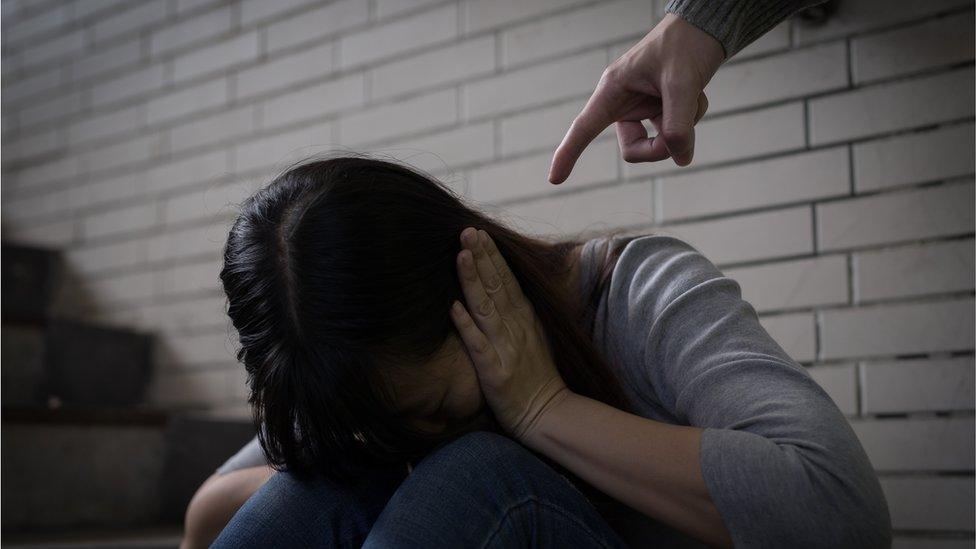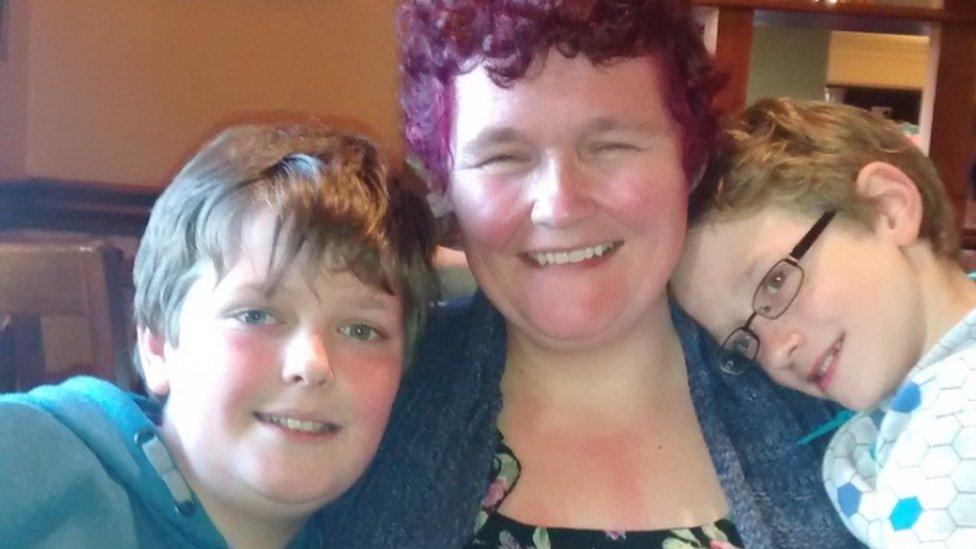Domestic abuse bill: Coercive control to become offence in Northern Ireland
- Published

Campaigners want the law to recognise not all domestic abuse involves physical violence
Westminster legislation to protect domestic abuse victims from a form of bullying known as "coercive control" is to be extended to Northern Ireland.
Ex-Stormont justice minister Claire Sugden, who has campaigned for the law to be updated, hailed the move as a "huge success" for abuse victims.
The Department of Justice said it will be included in the Domestic Abuse Bill., external
Coercive control includes psychological abuse and non-violent intimidation.
It has been a crime in England and Wales since 2015,, external but Northern Ireland has lagged behind as it has not had a functioning devolved government since January 2017.
"Any form of domestic violence is completely unacceptable," said Department of Justice Permanent Secretary Peter May.
"The new domestic abuse offence will criminalise patterns of coercive and controlling behaviour."
'Sheer dominance'
Londonderry District Judge Barney McElholm said the change would allow authorities to "interrupt perpetrators' behaviour at a much earlier stage".
The judge, who has campaigned for domestic abuse victims, said the damage caused by a controlling partner can be devastating.
"Even without violence, the sheer dominance of one person over another is not something we can accept in society, it's wrong, it's unfair, and it's damaging for children to grow up in such an environment," he said.
'Biggest regret'
Organisations which help victims of domestic abuse, like Women's Aid, have long campaigned for the law to recognise that violence within intimate relationships is often preceded by a pattern of non-violent repression and controlling behaviour.

Ms Sugden served as Northern Ireland's justice minister from May 2016 to March 2017 and said tackling domestic abuse had been her "overarching priority".
"My biggest regret of the Stormont collapse is not fulfilling my promise to get domestic abuse law onto statute while minister," she wrote on her social media accounts.
Allow X content?
This article contains content provided by X. We ask for your permission before anything is loaded, as they may be using cookies and other technologies. You may want to read X’s cookie policy, external and privacy policy, external before accepting. To view this content choose ‘accept and continue’.
The move follows ongoing controversy over Westminster's involvement in other areas of devolved government.
A push to liberalise abortion and introduce same-sex marriage in Northern Ireland if devolution is not restored is currently under consideration after Labour MPs added amendments to the Northern Ireland (Executive Formation) Bill.

Claire Sugden tweeted that her "heart is bursting" with happiness after the campaign's success
Ms Sugden acknowledged it was not ideal that Westminster will update Northern Ireland's domestic abuse legislation, but said the issue could not be delayed any longer.

Examples of coercive control:
Being stopped from working or going to school/college/university
Having money taken away or controlled
Being isolated from friends and family
Having access to food, drinks and day-to-day products restricted
Having their social media accounts monitored or controlled
Being told what they should wear
Being threatened with violence if they do not behave in a certain way
Having threats made to loved ones or pets
Read more from BBC Newsbeat: How to tell if your partner's controlling you

Women's Aid Belfast and Lisburn said the forthcoming legislation was a "welcome step forward", as Northern Ireland was currently "the only region in the UK and Ireland" where victims are not protected from coercive control.
Speaking to BBC Radio Ulster's Evening Extra programme, Brendan McGuigan, chief inspector of criminal justice in Northern Ireland, said new legislation was needed.
"It is beholden on the criminal justice system to have everything in its power available to support those victims to ensure that they can continue on," he said.
- Published19 June 2019

- Published14 June 2019

- Published3 April 2019

- Published21 January 2019
